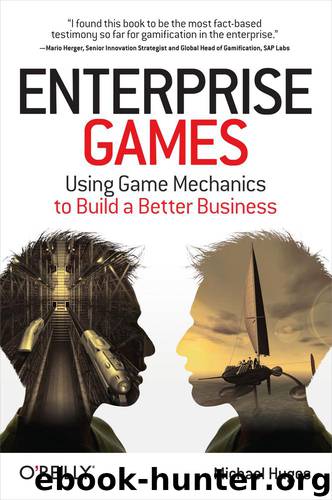Enterprise Games by Michael Hugos

Author:Michael Hugos [Michael Hugos]
Language: eng
Format: epub
Tags: BUSINESS & ECONOMICS / Decision-Making & Problem Solving
ISBN: 9781449319557
Publisher: O'Reilly Media
Published: 2012-09-13T16:00:00+00:00
Figure 8-6. Salespeople zero in on specific items
Game Metaphor Extends Through to System Rollout
We rolled out the first version of the system and lavished attention on the first few sales offices that began using it. Those few sales offices started to show slight but noticeable increases in daily sales and gross profits. This induced one of the four regional vice presidents to publicly commit to switching over all the offices in his region to the new system.
Over the following months, we worked closely with the sales offices in that VP’s region and continued to add new features, fix bugs, and smooth out rough edges as we got feedback from those sales offices. In those months, the region using the new system clearly outperformed the other regions. And that information was available online for everyone to see in the form of daily, weekly, and monthly sales reports.
This created a welcome bandwagon effect. We made the rollout of the new system into a game itself. We worked with the bigger offices in each region and they would in turn train the smaller offices. A team of training and IT people would show up in person and spend a day and a half with the salespeople in those bigger offices.
We would start usually on a Tuesday afternoon at 5:30, after normal business hours (Mondays were not good, they never are). In a well-rehearsed 90-minute session, we walked people through a system overview, helped them to log in to the new system, and as a group we worked through some common tasks. They saw how the system made it easier to look up products and how it gave them better information for pricing decisions. We showed how the system helped them engage customers in conversations to find out more about their projects and to suggest other products that would be useful. We pointed out that there was a pattern to these activities and showed how we had designed the system to accommodate that pattern.
As with the launch of any new system (or game), it was often met initially with skepticism or indifference. Any new system (even one that people say they want) involves a lot of change in the way work gets done. And convincing people who are already busy to make those changes and take the time to learn new things is a huge challenge.
After the system demo, we would take the salespeople out to a white-tablecloth restaurant—the kind of place they would take one of their best customers. The social environment that created was a great opportunity for system developers and salespeople to talk one on one and to form personal relationships. The next day, we would spend the whole day sitting with different salespeople—watching, listening, and giving help when asked. The developers wore headsets and plugged into a phone jack in each salesperson’s cubicle so that they could listen as the salesperson talked with customers and used the new system.
The developers also played a game within the broader game of rolling out the system.
Download
This site does not store any files on its server. We only index and link to content provided by other sites. Please contact the content providers to delete copyright contents if any and email us, we'll remove relevant links or contents immediately.
Sass and Compass in Action by Wynn Netherland Nathan Weizenbaum Chris Eppstein Brandon Mathis(14871)
Implementing Enterprise Observability for Success by Manisha Agrawal and Karun Krishnannair(8247)
Supercharging Productivity with Trello by Brittany Joiner(7503)
Mastering Tableau 2023 - Fourth Edition by Marleen Meier(7246)
Inkscape by Example by István Szép(7145)
Visualize Complex Processes with Microsoft Visio by David J Parker & Šenaj Lelić(6821)
Build Stunning Real-time VFX with Unreal Engine 5 by Hrishikesh Andurlekar(5846)
Design Made Easy with Inkscape by Christopher Rogers(5108)
Customizing Microsoft Teams by Gopi Kondameda(4650)
Business Intelligence Career Master Plan by Eduardo Chavez & Danny Moncada(4624)
Extending Microsoft Power Apps with Power Apps Component Framework by Danish Naglekar(4255)
Salesforce Platform Enterprise Architecture - Fourth Edition by Andrew Fawcett(4123)
Pandas Cookbook by Theodore Petrou(4105)
Linux Device Driver Development Cookbook by Rodolfo Giometti(4072)
The Tableau Workshop by Sumit Gupta Sylvester Pinto Shweta Sankhe-Savale JC Gillet and Kenneth Michael Cherven(3907)
Exploring Microsoft Excel's Hidden Treasures by David Ringstrom(3409)
TCP IP by Todd Lammle(3184)
Drawing Shortcuts: Developing Quick Drawing Skills Using Today's Technology by Leggitt Jim(3080)
Applied Predictive Modeling by Max Kuhn & Kjell Johnson(3070)
